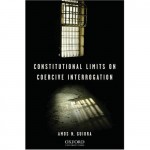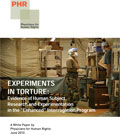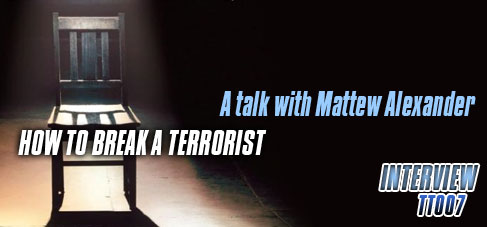
Prof. Amos Guiora - Author of Constitutional Limits of Coercive Interrogation
Reprinted with permission from The Jurist – First JURIST publication link
Listen to interview with Prof. Amos Guiora from this week’s show
Listen to reading of Op-Ed and an interview on the Bagram Decision
Listen Here
Author of
Freedom from Religion – Link
Constitutional Limits on Coercive Interrogation – Link
The DC Circuit Court’s recent decision overturning a holding extending habeas corpusrights to Bagram detainees is a dark hour for the American judiciary. Simply put, the Court’s unanimous decision violates human rights.
The Court argued that detainees held in an “active theater of war in a territory under neither the de facto nor de jure sovereignty of the United States and within the territory of another de jure sovereign” are not entitled to habeas corpus. The decision results in a judicially sanctioned indefinite detention regime.
In its decision the Circuit Court sanctions the indefinite detention regime implemented by President Bush, largely maintained by President Obama. Indefinite detention flies in the face both of the rule of law and morality in armed conflict. In other words, the Court guarantees continued denial of basic due process rights to thousands of detained individuals.
Those individuals–some justifiably detained, others not—are innocent until proven guilty. Because of the Circuit Court, adjudication of guilt or innocence, much less habeas protection is but a pipe dream.
My 20 years experience in operational counterterrorism decision making unequivocally convinced me that detainees must have their ‘day in court’. Otherwise, adjudication of individual responsibility is placed in abeyance, more permanent than temporary.
While former Chief Justice of the Israeli Supreme Court, Aharon Barak, wrote “the logistical considerations of the state must not be a barrier to individual rights,” late Chief Justice Rehnquist argued that in times of armed conflict the Court must be reticent with respect to the executive branch.
Regrettably, the DC Circuit Court adopted Rehnquist’s approach; its decision flies in the face of Barak’s thesis that detainee rights outweigh other considerations. Operational counterterrorism demands respect for and application of human rights.
To that end, even under extraordinarily complicated operational circumstances, both initial detention and subsequent remand of Palestinians suspected of involvement in terrorism were subject to independent judicial review. In accordance with prosecutorial discretion, indictments were filed when supported by evidence.
At trial, either before Israeli civilian courts or Military Courts in the West Bank and Gaza Strip, defendants confronted their accusers in accordance with rules of criminal procedure and evidentiary requirements befitting a Western democracy. In other words, adjudication of criminal responsibility was guaranteed in a trial before a court of law.
Critics have pointed out that the overwhelming majority of Palestinians are convicted based on plea bargains, thereby suggesting a fundamental flaw in the system. However, similar statistics can be found in criminal cases in most major American cities. In both systems defendants have the right to a full trial. Unfortunately, the same cannot be said for the approximately 25,000 individuals held–directly and indirectly–by the US in Afghanistan.
Israel has, over the years, administratively detained tens of thousands of Palestinians. The primary justification is the requirement to protect intelligence sources that provide vital information regarding future terrorist attacks. During my military service I served both as military prosecutor and judge in administrative detention hearings. In addition, I was tasked with providing senior military commanders legal advice regarding individual detention decisions.
The process is highly problematic and controversial because the detainee is denied the right to confront his accuser; it has been widely criticized by the human rights community. However, the decision to detain is subject to independent judicial review by the Israel Supreme Court and is term-limited. The measure represents an unsatisfactory resolution to an improbable dilemma confronting decision makers seeking to prevent future terrorist attacks.
Flawed as it may be, this process seeks balancing legitimate national security considerations with equally legitimate civil liberties. There is, obviously, no perfect process with respect to counterterrorism. I have made innumerable decisions with inherently flawed and problematic dilemmas. However, the guiding light must be granting the detained individual rights.
Decision makers hiding behind the cloak of convoluted judicial decisions significantly hamper legitimate counterterrorism. The test is facilitating justice under fire. It is an extraordinarily complicated mission. Precedent suggests it can be achieved provided the executive branch is committed and the judiciary does not provide unwarranted protection of government.
The decision by the DC Circuit Court provides the executive branch deeply troubling cover. Comparative counterterrorism analysis demonstrates granting detainees’ rights are essential to lawful operational counterterrorism. It is easy to create legal constructions that justify denial of basic rights.
Our legal system is the beacon on the hill, when it protects otherwise deniable rights. The paradigm must be ‘why’, not ‘why not’.
Hopefully the DC Circuit’s decision is not the last word and the Supreme Court will render justice where justice is due. That is the essence of operational counterterrorism subject to the rule of law.
Amos Guiora is Professor of Law at SJ Quinney College of Law, University of Utah; his latest book is Freedom from Religion: Rights and National Security (OUP).




